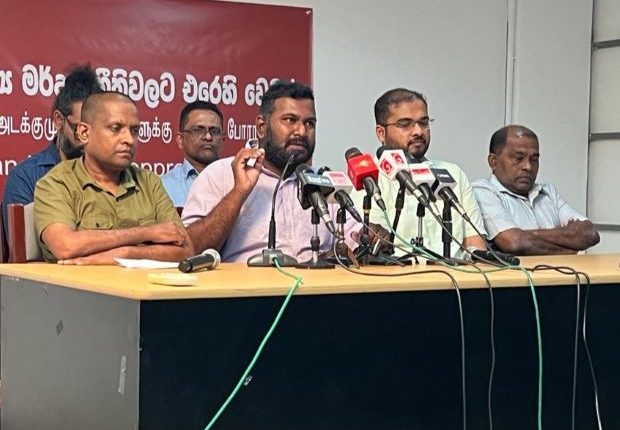Sri Lanka media groups vow to block Online Safety Bill amid rising concerns
By Shihar Aneez
COLOMBO – Sri Lanka’s key media groups have vowed to block the Online Safety Bill (OSB) which is being stubbornly pushed by President Ranil Wickremesinghe’s government amid rising chaos and concerns over the implications of the proposed law.
Though the government initially said the expected legislation was to protect children and women from negative impacts of the internet like pornography and harassment, the proposed law has alarmed many due to its many grey areas and lack of proper definitions.
Diplomats have said the United Nations also have raised concerns over the bill. But government sources have said the new law will be “somehow implemented”.
At least 45 petitions have been filed in the Supreme Court against the bill citing the proposed legislation as infringing fundamental human rights including freedom of expression.
Political analysts have said President Wickremesinghe’s government has gradually started to face public criticism with the policies made to suit the conditions of the International Monetary Fund (IMF) loan including higher taxes.
The key media organizations in Sri Lanka along with several trade unions have joined hands under the theme of ‘Stand Against Oppressive Law’ to stop the bill being enacted as a law.
“It is harmful for the freedom of expression and it creates a fear psychosis among the citizens and media on what they express online,” Ananda Jayasekera, a spokesman for Free Media Movement (FMM), a media rights organization, told reporters in Colombo on Tuesday (17).
The FMM has also filed a petition against the bill.
The bill is likely to be passed if the Supreme Court clears it. Most petitioners, however, believe the Supreme Court might determine that some of the clauses of the bill will want either a two-thirds Parliament majority in the 225-member legislature or a referendum or both.
Duminda Sampath, President of the Sri Lanka Working Journalist Association (SLWJA) urged the 225 members of current Parliament to go through the bill and assess the implications for themselves in the future.
“The high number of petitions shows that citizens understand something better than the 225 parliament members,” Sampath told reporters.
“This bill must be defeated in the Parliament. If it is passed, there will be only selective justice given we have witnessed some laws like Emergency Regulations and ICCPR (International Covenant on Civil and Political Rights) being applied in this country.”
“This is an act to hide the government’s corruption.”
Political analysts say the Wickremesinghe government is trying to curb public criticism on social media to prevent another mass street protests like the one last year that ousted Wickremesinghe’s predecessor Gotabaya Rajapaksa.
The key objectives of the bill include protecting persons against damage caused by misinformation and introducing measures to detect, prevent, and safeguard against misuse of online accounts and bots to commit offences.
However, a commission appointed by the president determining what should be prohibited online, non-specific offences that could manipulate the interpretation of the bill, and the commission having quasi-judicial powers have raised concerns that the bill, if it passed as it is, could threaten the media freedom as well as freedom of expression.
“This bill is urgently brought in. This was not consulted with the stakeholders at all. We don’t need this bill,” Tharindu Jayawardena, President of Young Journalists Association of Sri Lanka (YJASL) told the reporters.
The Supreme Court to deliberate the petitions Wednesday (18) through Friday (20) subsequent to which the determination on the bill will be delivered to the Parliament.
Sources in the government have said some social media companies and foreign investors also have raised concerns over the proposed law due to possible adverse impacts on their business.
Some stakeholders relevant to the bill at a meeting with Public Security Minister Tiran Alles last week said that a social agitation has been created due to lack of broader discussion about the bill before presenting it to the Parliament.
They also said the bill could deprive the freedom of expression and a politically motivated non-independent commission would be overseeing online content.
Alles, who tabled the controversial bill in the Parliament, has agreed to have broader consultation with key stakeholders before voting in the legislature.
“We don’t know how the minister discussed the bill without any members of the media,” Jayawardena said.
“What the government is trying to do now is to show its hands are clean and they have consulted us. This is a dangerous law and it has to be stopped by any means. We will have to do something in addition to the legal means to stop this,” Jayawardena said.
Legal experts have strongly opposed the bill as it gives legal powers to a commission whose members will be handpicked by the president.
-economynext.com



Comments are closed, but trackbacks and pingbacks are open.